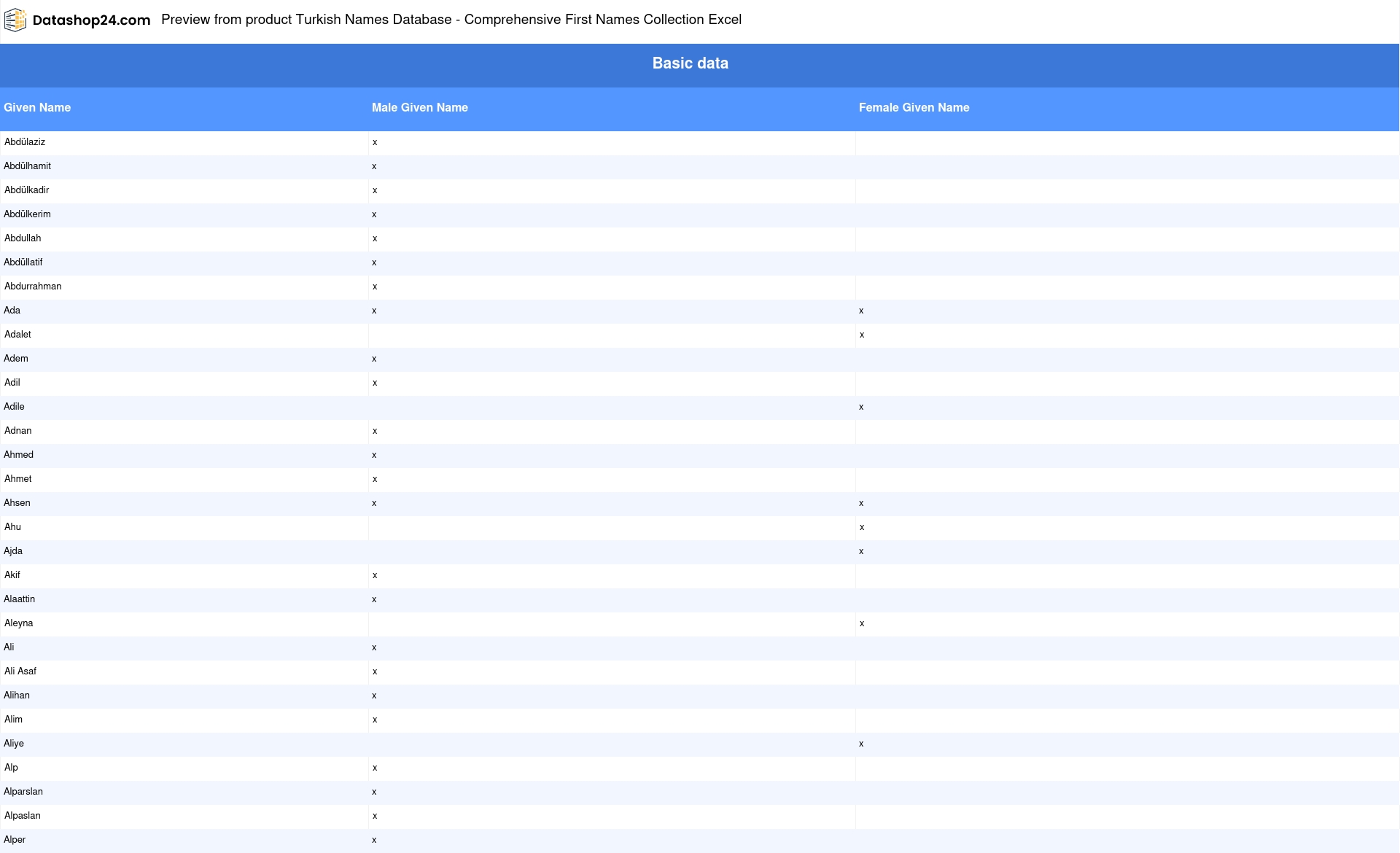Turkish Names Database - Comprehensive First Names Collection Excel
Essential Database Information for Turkish Names






 Up-to-date and carefully verified data
Up-to-date and carefully verified data Company-wide unlimited usage period
Company-wide unlimited usage period No waiting, immediate access after purchase
No waiting, immediate access after purchaseComprehensive Turkish Names Database with Gender Classification
Our Turkish names database contains 803 carefully curated first names from Turkey with precise gender classification. Each entry includes the first name and its corresponding gender designation (male, female, or unisex), providing you with essential data for various applications. The database is delivered in Excel format, making it easy to filter, sort, and integrate into CRM systems, marketing tools, or other databases. Whether you're developing software applications, conducting demographic research, or creating personalized marketing campaigns, this structured dataset offers reliable reference data for Turkish male names and Turkish female names.
The following table provides an overview of the database structure and content:
Basic data
Advantages of Purchasing Our Turkish Names Database
Acquiring a ready-made Turkish names database offers significant advantages over conducting your own research, particularly when dealing with the complexities of Turkish naming conventions and cultural diversity. Here are the key benefits of our professionally compiled dataset:
- Time-saving efficiency: Researching and compiling Turkish boy names and Turkish girl names from various sources can take weeks or months. Our database provides immediate access to a comprehensive collection from Turkey and Turkish-speaking regions.
- Cultural accuracy: Turkish names follow specific linguistic patterns and cultural traditions. Our database includes authentic Turkish names that reflect proper naming conventions, historical influences, and modern Turkish preferences.
- Gender classification reliability: Determining gender classification for Turkish names requires expertise in Turkish linguistics and cultural contexts, especially for names with similar endings or those with Ottoman heritage.
- Structured data format: The Excel format allows for immediate integration into your existing systems without additional formatting or data cleaning requirements.
- Regional representation: Our database includes Turkish names from different historical periods and cultural influences, reflecting the evolution of naming practices in Turkey and broader Anatolian heritage.
- Quality assurance: Each entry undergoes validation processes using modern algorithms and cultural verification to ensure accuracy and authenticity.
Useful Information and Frequently Asked Questions about Turkish Names
What are popular Turkish boy names?
Popular Turkish boy names include both traditional names with Ottoman or Islamic heritage and contemporary choices. Examples include Mehmet, Ali, Mustafa, Ahmet, Emre, Can, and Efe. These Turkish male names often reflect the country's Islamic heritage, Turkic roots, or modern secular influences while maintaining distinctly Turkish linguistic characteristics and cultural significance.
What are popular Turkish girl names?
Popular Turkish girl names encompass classic choices with historical significance and modern options reflecting contemporary trends. Examples include Fatma, Ayse, Zeynep, Elif, Defne, Selin, and Ece. These Turkish female names often have elegant sounds and may show influences from Islamic tradition, nature themes, or Turkish literature while maintaining authentic Turkish cultural identity.
Fascinating Facts About Turkish Names
Turkish naming traditions reflect a rich cultural tapestry spanning centuries of Anatolian, Ottoman, and modern Republican influences. Many Turkish names derive from Arabic and Persian origins due to Islamic heritage, while others have ancient Turkic roots from Central Asian traditions. During the Ottoman Empire, Arabic and Persian names dominated the upper classes, while Turkic names remained popular among rural populations. The establishment of the Turkish Republic in 1923 brought significant changes, with language reforms encouraging the use of purely Turkish names and meanings. Interestingly, Turkey implemented surname laws in 1934, requiring all citizens to adopt family names, often choosing names that reflected geographic origins, professions, or desired characteristics. Many Turkish names have beautiful meanings often related to nature, virtues, or poetic concepts - names like Gül (rose), Deniz (sea), or Yildiz (star) reflect the Turkish appreciation for natural beauty. The influence of Turkish literature and cinema has shaped modern naming trends, with certain names gaining popularity through beloved characters in novels and films. Regional variations exist across Turkey, with some areas showing Kurdish, Arabic, or Greek influences depending on historical demographics. Modern Turkish parents increasingly balance traditional values with contemporary preferences, often choosing names that work both domestically and internationally while maintaining Turkish cultural authenticity.






 Up-to-date and carefully verified data
Up-to-date and carefully verified data Company-wide unlimited usage period
Company-wide unlimited usage period No waiting, immediate access after purchase
No waiting, immediate access after purchase







